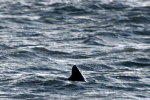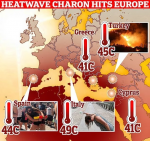The Earth Is Dancing Too Close to a Temperature Tipping Point
Analysis by F.D. Flam | Bloomberg
July 19, 2023 at 6:47 a.m. EDT
Comment
Gift
Share
Between this summer’s biblical floods, apocalyptic fires and life-threatening heat domes, people are starting to wonder whether we’ve lurched over some sort of climate tipping point. Climate scientists and ecologists who study tipping points say what we’re seeing are merely extreme events amplified by global warming. But they’ve been warning about the risk of climate tipping points for years. Now people are listening.
Research published last year in Science suggests the risk of a global tipping point that triggers accelerated climate warming starts to become significant once average worldwide temperatures rise 1.5C above pre-industrial levels. That’s likely to happen in the 2030s.
In popular usage, tipping points refer to anything that changes suddenly. In science, it usually refers to a straw-that-broke-the-camel’s-back phenomenon, where a small change in input makes a big difference in outcome.
When climate scientists talk about tipping points, they’re looking at a shift in feedback loops — the disruption of stabilizing feedback loops and the start of new ones that amplify change. Physicists refer to this as a positive feedback loop, but from our standpoint it won’t be beneficial.
Scientists have documented dozens of regional and local climate tipping points. And long ago, the Earth experienced planet-wide tipping points when the climate whiplashed from an ice-free hothouse to a snowball and back again.
Looking at some of that long-term history for an Earth Day column a few years ago, I talked to scientists who marveled that Earth has been habitable for almost its entire existence — nearly 4 billion years — thanks to stabilizing feedback loops. Even so, for most of that history, there was no complex life — only bacteria. And sudden shifts in climactic feedback loops did roil the planet. After the advent of complex life, some of these led to mass death and extinction.
And one more reason to be concerned today: The rate of change we’re imposing on the planet is “geologically unusual,” as planetary scientist Andy Knoll told me then.
What scientists are most worried about now are regional changes that tip into global catastrophes. Timothy Lenton, chair in climate change and earth system science at the University of Exeter, refers to “tipping elements” — systems of glaciers, forests and coral reefs whose collapse could trigger a form of global warming that feeds on itself. He and colleagues first identified a number of these in a 2008 study, but he said they’re generating much more interest now.
He also led a more recent review of studies highlighting the tipping elements that pose the most immediate threat — the destruction of the West Antarctic and Greenland ice sheets, the thawing of the permafrost and the destruction of the world’s coral reefs.
He said the extreme events making the news this summer might represent an early warning sign he calls flickering — a brief visit to the other side of a tipping point. “A complex system can sometimes start to sample a different regime or state before it takes a more permanent shift into that state,” he said. “I hope it’s not the case.”
The tipping point phenomenon has led to the collapse of local ecologies before, said Simon Willcock, an interdisciplinary researcher at Rothamsted Research in the UK. One good example is the Sahara Desert, which has gone from lush to dry in cycles, the most recent one possibly helped by humans.
In a paper published last month in Nature Sustainability, he and colleagues created complex models of ecosystem collapse, using two examples where tipping points happened in relatively recent history — the Chilika Lagoon in India, where fish populations collapsed, and Easter Island, where deforestation and other environmental stress led to extinction of the local human population.
What he found, he said, was that ecological tipping points can happen much faster than previous models had shown, once they took into account multiple stresses — not just temperature changes, but factors such as overgrazing, deforestation, agricultural runoff and overfishing.
Natural fluctuations — noise — also make tipping points more likely. Think of standing on the edge of a cliff, he said, with random gusts buffeting you toward and away from the brink. And consider someone nearby in still air on a similar cliff. “Who’s going to fall off the cliff first?” he asked. “It’s obvious, right?”
He also worries that too much clearing of the Amazon might dry things out just enough to start a massive fire. That would make the region drier, killing more trees, fueling more fire and lofting more carbon into the atmosphere, making the climate warmer and drier, and accelerating forest loss in a vicious cycle.
Our civilization is delicate — our dense population centers dependent on agriculture and lots of clean water. Although humanity survived shifts from ice ages to warm interglacial periods, our species has enjoyed an unusually quiescent period for the last 12,000 years, the point when we settled down and started farming.
A climate tipping point could make life a lot harder for our species. We’re not yet over the cliff, but we’re dancing dangerously near the edge
1













